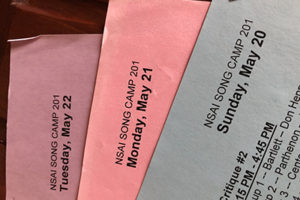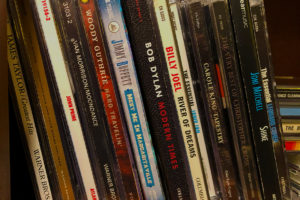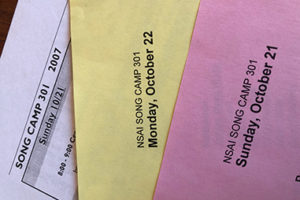The other day I pulled out a couple of CDs that I had not listened to in a long time—Lo Gai Saber: Troubadours et Jongleurs 1100-1300 and Forgotten Provence: Music-making in the South of France, 1150-1550. The CDs contain songs and poems by the earliest singer-songwriters or troubadours.
Joel Cohen in the liner notes of the first CD says the driving force in the songs is the poetry. There are about four thousand surviving poems from that era and only about two hundred preserved melodies. The CD recreates accompaniments in the spirit of the time they would have been written and performed.
In the second CD the Martin Best Consort takes the listener on a journey through ballads, rondeaux of popular origin, and includes 13th century motets from the Montpellier manuscript.
The music on both CDs is diverse and lyrical. It gives us a snapshot into that place and time. Though hundreds of years have passed, music remains a constant thread that weaves through history.
My Introduction to Troubadours
Troubadours were poets/composers and instrumentalists during the High Middle Ages (1100-1350). They typically remained in the employment of one person for long periods of time—although, there were many who traveled extensively from court to court. They provided entertainment by writing and performing songs about people, politics, religion, love—especially courtly love—and, they often brought news from other places.
The first troubadour whose work survives is Guilhem de Peiteus—a.k.a. Duke William IX of Aquitane (1071-1126). The original troubadours came from noble classes, but, as time went on, they also came from middle (merchants) and lower (tradesmen) classes.
A key trait of the troubadours was that they performed their own original material. The most common instruments used were lutes, gitterns, psalteries, rebecs, or citherns. Much like the folk artists of the 1960s their originality saw them embraced by their era.
There are around thirty genres of songs. Individual genres conveyed specific topics (love songs, laments, discordant feelings, riddles, satire, poetical debates, etc.). Often, genres were modified (love songs turned to religious topics) or fused (love songs with satires) to create a vehicle for expression that the original genre(s) did not quite allow.
The troubadour tradition flourished in southern France, northern Spain, and northern Italy during the late 11th century through the 13th century. Female troubadours were called trobairitz. Related movements sprang up throughout Europe: the Minnesang in Germany, trovadorismo in Galicia [Spain] and Portugal, and the trouveres in northern France.
I am one of the last of a small tribe of troubadours, who still believe that life is a beautiful and exciting journey, with a purpose and grace which are well worth singing about.
— Yip Harburg (1896-1981) American popular song lyricist and librettist
I first heard troubadour songs my freshman year in college when I took the class “Intro to Listening.” I was fascinated with the music. Music and words are powerful together. Songs illuminate thoughts, ideas, and stories in a simple, yet profound, way.
I am thankful that the songs of troubadours survived because they give us an interesting glimpse into their world. The feelings and ideas expressed in today’s music seem to echo those of the past. In fundamental ways—for good or ill—people don’t seem to change much.
Modern Songwriters

The tradition continues today in the work of modern songwriters—our troubadours. They provide both entertainment and commentary on all aspects of life. Woody Guthrie. Bob Dylan. Lennon and McCartney. Neil Young. Andrew Bird. Patti Griffin. Tracy Chapman. David Wilcox. Cliff Eberhardt. Don Henry. These are just a few examples.
Songs are important.
Songs reflect the times in which they are written and are also individual time capsules. They can tell a story and put us in someone else’s shoes—to see what they see and feel what they feel. A song can present an idea—be it a view of the world, a moral, a call to action, a political idea, or social commentary. Songs can challenge us and, perhaps, change our minds.
Songs can express an emotional state and make us sad, brighten our mood, make us wistful, or provide comfort. A song can muster up memories and make us feel the same emotions we were feeling when we first heard the song. It can take us back to our childhood, our first love, when we left home, or some other time or place.
Songs are important for human connection—by bringing us together either physically or emotionally. Everyone wants to hear a little of themselves in a song—something to make us feel not so alone in this world. Troubadours (singer-songwriters) sing from the heart and tell stories—all our stories!
Songs make life better. I can’t imagine a world without music, and, especially songs.










Leave a Reply
Your email is safe with us.